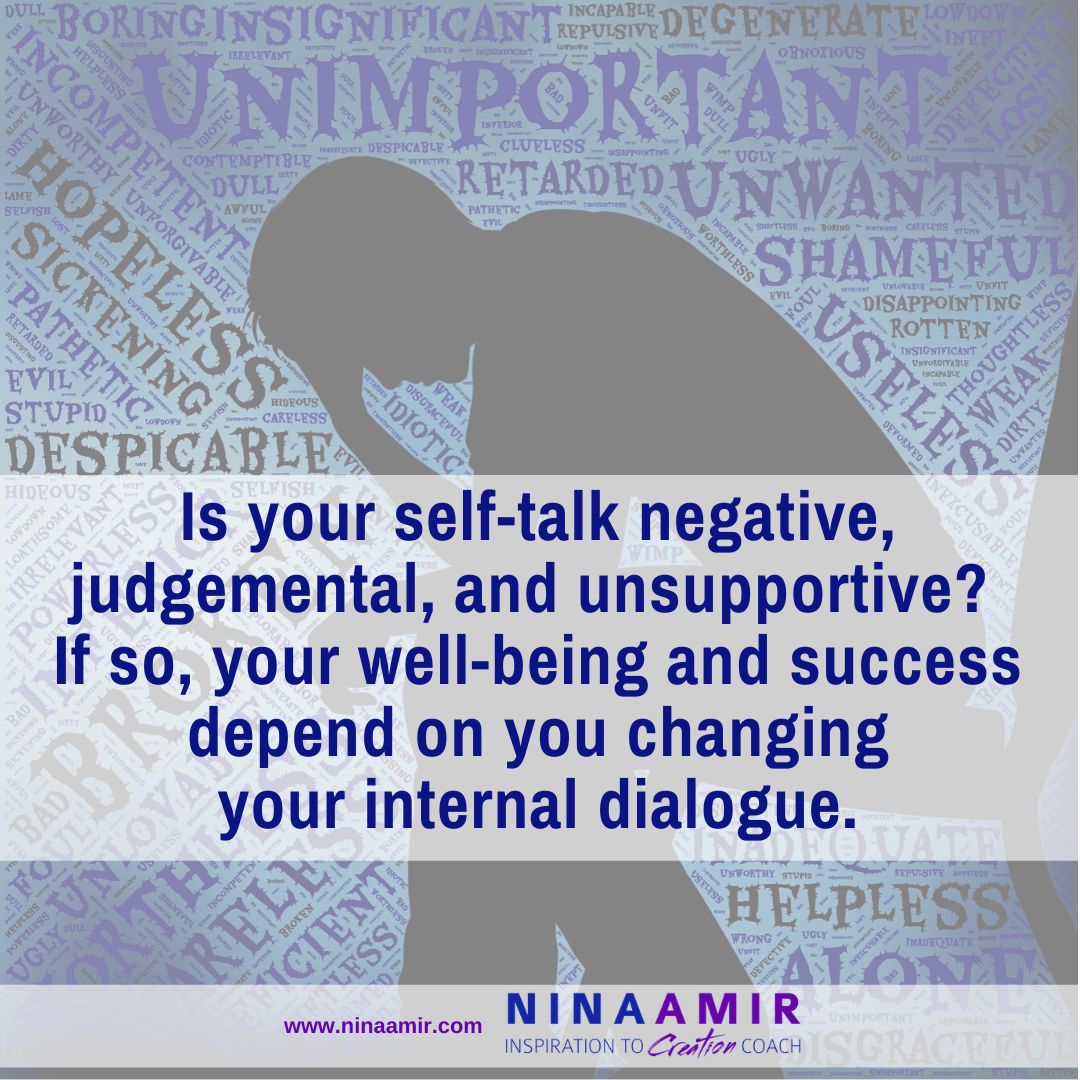 You talk to yourself all the time, but most of what you say is unsupportive. Even people who work hard to develop a positive self-talk habit find their negative voice speaks more often than they’d like. You likely tell yourself things like:
You talk to yourself all the time, but most of what you say is unsupportive. Even people who work hard to develop a positive self-talk habit find their negative voice speaks more often than they’d like. You likely tell yourself things like:You can’t do that.
You are unlovable.
You aren’t good enough to…
What made you think you could succeed?
You are a failure.
No one wants to hear what you have to say.
Does that type of self-talk help you achieve your dreams? Not likely.Would you choose to become friends with a person who spoke to you like that? Probably not.
It’s time to be a better friend to yourself…to love yourself enough to change your self-talk. Your well-being and success depend on a positive and supportive internal dialogue.
Your Negative Self-Talk
For the next 24 hours, pay attention to your self-talk. Is the conversation you have with yourself loving, hateful, kind, judgmental, or downright mean?
According to Shad Helmstetter, Ph.D., author of What to Say When You Talk to Yourself, 77 percent of what we tell ourselves is counter-productive or negative. Only a tiny percentage of your self-talk boosts your self-confidence and self-esteem and supports your efforts to achieve goals.
While you occasionally speak aloud, most of what you say to yourself is an unspoken mental conversation. That means your self-talk consists of thoughts.
According to research conducted by the National Science Foundation, around 80% of our thoughts are negative. And we have an average of 12,000–50,000 thoughts daily.
That’s an enormous amount of negative mental chatter every single day. It’s no wonder you lack confidence and self-worth, right?
[Tweet “It’s time to be a better friend to yourself…to love yourself enough to change your self-talk. “]
Words are Powerful
Thoughts are comprised of words, and words are enormously powerful. In fact, they have an energy of their own and are creative in nature. Even if you don’t believe words create, you can agree that [words have an impact]https://ninaamir.com/turn-words-hurt-beliefs-help/)—especially when spoken to or about someone.
When a person says something about you—good or bad—you feel those words emotionally and interpret them in ways that form beliefs about yourself. You retain the experience of what those words meant for years—sometimes even for life. For this reason, what others say changes how you see and feel and what you believe about yourself. Those perceptions and beliefs can mean the difference between success and failure.
Learned Self-Talk
You learned your self-talk from what was said about you at a young age. When parents, siblings, teachers, coaches, and relatives spoke about you, you adopted their verbiage. It became the language of your self-talk.
For example, maybe a teacher said you were stupid or a parent behaved in a manner that demonstrated that they thought you were dumb. You likely decided you were, indeed, stupid. As a result, you began telling yourself, “You are stupid.”
The judgments of others get programmed into your mind as beliefs. And you repeat these beliefs, reinforcing them with each repetition.
[Tweet “ You talk to yourself all the time, but most of what you say is unsupportive.”]
Self-Talk Influences Results
Your beliefs become your outlook on life—your attitude and mindset. They generate feelings in your body.
Your beliefs and feelings lead to actions. You make choices about what to do as a result of what you feel, believe, and tell yourself repeatedly.
Eventually, your beliefs, attitude and mindset, feelings, and actions lead to results. Negative self-talk leads to unwanted results, while positive self-talk leads to wanted results.
Boost Your Self-Image
Negative self-talk also impacts how you see yourself. For instance, your internal conversation might convince you that you’re incompetent to take on specific tasks, are too fat or too skinny for someone to find you attractive, or too stupid to learn something new.
Consider people who suffer from anorexia, who often equate thinness with self-worth. They look at themselves in the mirror and see someone fat—even though they are skinny. People who stay in abusive relationships often see themselves as unworthy of being treated kindly or deserving of punishment.
These self-images stem from self-talk, which is based on beliefs. Their inner conversations cause them to feel and see themselves a certain way and believe something that isn’t true.
If you want to boost your self-image, change how you speak to yourself. You’ll be amazed at how your inner conversations can transform your self-perception.
[Tweet “Negative self-talk leads to unwanted results, while positive self-talk leads to wanted results.”]
Choose What to Say to Yourself
You talk to yourself all the time unconsciously. If you want to create change in yourself and your life, begin having those conversations consciously.
So, what should you say when you speak to yourself? Speak to yourself the way you’d like to be spoken to—the way you wish others had spoken or would speak to you.
Start with something positive that boosts your self-esteem and self-confidence. Be your best cheerleader. Tell yourself:
You can do it!
You are amazing!
You are intelligent and talented!
You are worthy!
And don’t forget to say, “I love you,” too.
3 Ways to Transform Your Self-Talk
Here are three ways to change your self-talk:
1. Affirmations
Affirmations have become the go-to method for developing positive self-talk. And these positive statements about yourself do a great job of reprogramming your brain.
To put affirmations—or positive self-talk—to use, make a list of all the positive things you wish people—parents, coaches, friends, bosses, colleagues, or teaches—had said or would say to you.
Once you have a list, speak them aloud to yourself several times per day. You also can write them repeatedly or say them silently in your mind.
2. Record your positive self-talk (affirmations).
Recording yourself speaking your affirmations is a powerful way to use your list and reprogram your mind for positive self-talk. Doing so is easy with most cell phones or a variety of computer programs.
You can record them in the first and second-person points of view, and your name included.
- First-person tense is the I/we perspective.
- Second-person tense is the you perspective.
For instance:
I am happy.
You are happy.
We are happy.
Nina, you are happy.
Nina is happy.
Your mind receives these varied affirmations in different ways. And when you repeatedly say these positive statements to yourself, you help facilitate new neural pathways. Simply stated, this practice reprograms your brain—and your self-talk.
Of course, you also can purchase an affirmation recording. Many companies offer them. While they are effective, hearing your voice saying the things you most need to hear will achieve more powerful results.
Listen to the recording at least twice per day, preferably after waking or before going to sleep. However, you can listen to them in the car or when working out, or just about any time.
3. Imagine people speaking to you in the way you desire.
Visualization is another effective way to reprogram your brain. You can imagine people saying the things you would like them to tell you.
Even better, learn self-hypnosis. Many sites sell audios that teach you how to do this.
Then, while in a hypnotic state or visualizing, see and hear people positively speaking to you. Also, feel what it is like to have people talk to you in this manner.
Here’s another approach: While in the hypnotic state or visualizing, experience yourself speaking positively to yourself. Imagine situations in which positive self-talk would help you move toward your goals. See, hear, and feel what it would be like to speak to yourself in a supportive manner.
[Tweet “You talk to yourself all the time unconsciously. If you want to create change in yourself and your life, begin having those conversations consciously. “]
Pay Attention to Your Words
If you want results in a specific area of your life—like health, business, finances, or relationships—pay attention to how you speak to yourself about those life arenas. Then, develop a list of affirmations specific to your goals in that area. Use this new list in the same ways mentioned above.
Keep in mind that what you say aloud is as important—if not more important—as your internal self-talk. Become conscious of what you say to yourself aloud, like:
I can’t…
I’ve never…
I’m not the type of person who…
I find it hard to…
Become hyper-vigilant about the things you say about and to yourself. Stop creating and perpetuating negative and unsupportive thoughts and beliefs.
If you catch yourself saying something negative—silently or aloud, you can modify the energy of the statement by adding the following qualifiers:
…yet
…until recently
For instance, I have never been good with money…until recently or I can’t seem to lose weight…yet.
Speak from Your New Identity
If you want to be someone who speaks positively to yourself, step into that identity. Speak to yourself in a manner befitting of that type of person.
For example, if you want to be a nonsmoker, you wouldn’t tell yourself that you want a cigarette or that you can’t break the smoking habit. You would say, I am now a nonsmoker. Similarly, you might want to be someone who exercises daily. If you embody that identity, your self-talk would include affirmations like I am someone who exercises daily.
You become what you say to and about yourself. Speak to and about yourself in a positive and supportive manner. Change your self-talk, and watch how your life transforms.
What is the quality of your self-talk? Tell me in a comment below, and please share this post with a friend.
Never miss one of my videos! Click here to subscribe to my YouTube channel.
 Ready to create what you want? Imagine what that future would be like… Join the Inspired Creator Community. As a member, you will discover how to change from the inside out. Finally, be the person who does the things that allow you to create what you desire. Gain access to a world-class Certified High Performance Coaching program, a proprietary Inspired Results Coaching program, Author Coaching, and strategies for living a life that feeds your soul. As you will discover, you are a powerful creator. It’s time to create what you want, is it not?
Ready to create what you want? Imagine what that future would be like… Join the Inspired Creator Community. As a member, you will discover how to change from the inside out. Finally, be the person who does the things that allow you to create what you desire. Gain access to a world-class Certified High Performance Coaching program, a proprietary Inspired Results Coaching program, Author Coaching, and strategies for living a life that feeds your soul. As you will discover, you are a powerful creator. It’s time to create what you want, is it not?



No one much talked to me after I was about two, so my self talk is largely my own voice with my own ideas. That is good and bad. I miss having the voices of authority of past adults and parents. On the other hand I am free to invent what I want and need to hear.
I do wonder about kids these days who hear nothing but positive happy talk. How will that play out in their lives?
Hearing positive happy talk will make them positive and happy people.
MUjmPuto